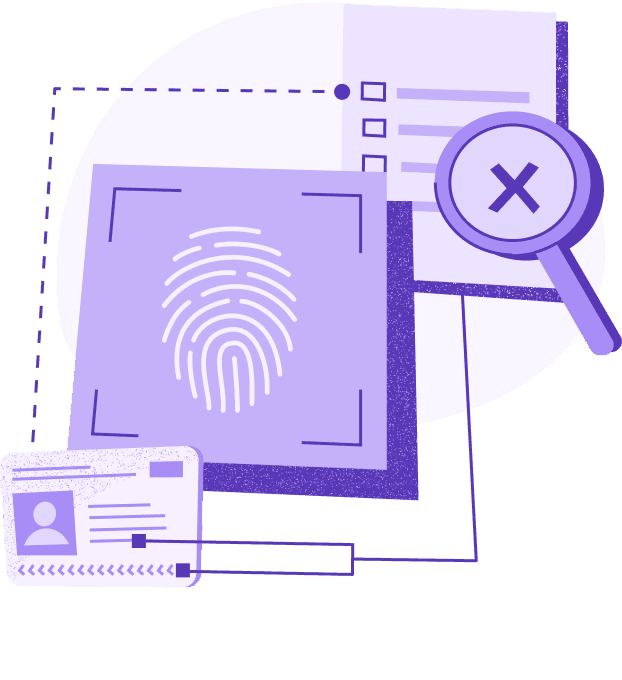Article
4 min read
A Guide to Employee Background Checks in Romania
Employee background checks
Legal & compliance

Author
Michał Kowalewski
Last Update
September 05, 2025

Table of Contents
Essential information for a background check in Romania
Are background checks legal in Romania?
What types of background checks are illegal in Romania?
Common background check industries
Types of background checks in Romania
When should you run employee background checks in Romania
Background check mistakes to avoid in Romania
Step-by-step guide to employee background checks in Romania
Key takeaways
- Well-executed background checks ensure a detailed verification of employment history, education, criminal records, and other relevant checks for informed hiring.
- Background checks are legal in Romania but require the candidate's written consent and data protection compliance (GDPR). Unauthorized checks, ignoring data protection, gathering excessive data, and discriminatory practices can have legal and reputational consequences.
- Employment history, education, and criminal records are common, especially in finance, healthcare, and government. Drug testing and international checks are less frequent.
Employee background checks should be an integral part of your recruitment process when looking to hire in Romania. Although not mandatory, they are a common practice, especially in banking, finance, healthcare, education, government, and public sector industries.
Pre-employment background check of your job applicants not only helps confirm the competencies of your new hire but also ensures a safe and reliable working environment.
In this article, you will discover:
- How to run an effective and legal employment screening in Romania
- What types of checks are the most common
- What mistakes to avoid when performing a background check in Romania
Essential information for a background check in Romania
An employee background check is the process of verifying a potential hire’s work history, education, professional qualifications, and any criminal records they might have. It’s particularly beneficial to run before finalizing an employment offer or signing a contract, as it ensures the candidate meets the company's standards and requirements.
As Romania is a member of the European Union, employee background checks and the processing of personal data are governed by the General Data Protection Regulation (GDPR). Additionally, there are national laws that provide specific measures for its implementation.
The key national legislation includes Law no. 190/2018, which lays down certain measures for implementing the GDPR, and is supplemented by Law no. 129/2018 which amends and supplements the law regarding the National Supervisory Authority for Personal Data Processing.
The National Supervisory Authority for Personal Data Processing (ANSPDCP) is the key regulatory body in Romania for enforcing data protection laws, and it has issued several decisions to guide the application of GDPR, including those related to Data Protection Impact Assessments (DPIAs) and the processing of personal data for statistical purposes.
Are background checks legal in Romania?
Background checks are legal in Romania, provided that they adhere to GDPR and the provisions of the Law on the Processing of Personal Data and the Protection of Privacy in the electronic communications sector.
Employers are allowed to conduct background checks on potential employees as long as they obtain the candidate's explicit consent and ensure that the information gathered is relevant to the job position. Although it’s not specified in the law, written consent is recommended for documentation and compliance purposes.
Employers must also inform candidates about the purpose of the background check, the categories of personal data that will be processed, and the potential consequences of providing false or misleading information. Transparency and fairness are key principles that guide the legality of background checks in Romania.
Compliance
What types of background checks are illegal in Romania?
In Romania, certain types of background checks are considered illegal or restricted.
- Conducting background checks without the candidate’s explicit consent is prohibited
- Conducting checks on an individual's religious beliefs, sexual orientation, or political affiliations is prohibited
- Employers are not allowed to request information about a candidate's health status or medical history unless it directly relates to the specific job requirements or workplace safety
- Employers should refrain from using lie detector tests or similar methods as part of the background screening process, as these are considered invasive and are not permitted under Romanian law
Violating data protection laws in Romania can result in a range of penalties, both administrative and financial, depending on the severity of the breach and the nature of the data involved.
For minor infractions or first-time offenses, the National Supervisory Authority for Personal Data Processing (ANSPDCP) may issue a warning and require corrective measures.
According to Multilaw, for major violations the ANSPDCP can impose fines ranging from RON 5,000 (approx. €1,100) to RON 100,000 (approx. €22,000) for violations of the General Data Protection Regulation (GDPR) or national data protection laws. For companies with a turnover exceeding RON 5,000,000 (approx. €1,000,000), fines can be up to 2% of their annual turnover.
Common background check industries
In Romania, background checks are especially prevalent in a few key industries, including:
- Banking and finance: Due to the sensitive nature of financial transactions and client trust, background checks are common in this sector
- Healthcare: Employers in the healthcare industry often conduct thorough background checks to ensure patient safety and compliance with industry regulations
- Government and Public Sector: Background checks are standard practice in government and public sector roles to uphold public trust and security.
- Education: Educational institutions frequently conduct background checks to ensure the safety and well-being of students and staff
Types of background checks in Romania
In Romania, the scope of employment screening includes a few critical areas that will help you assess a candidate's competencies. Understanding these types can help employers tailor their screening processes to meet specific job requirements and legal standards.
| Type of Check | Common in Romania | Reason |
|---|---|---|
| Employment History | Common | Ensures accuracy of the candidate's work history and performance. |
| Educational Verification | Common | Crucial for assessing the candidate's legal history and ensuring workplace safety. |
| Criminal Records Check | Common | Important, as it assesses potential risks and legal compliance. |
| Reference Checks | Common | Essential in confirming candidate's work experience, and professional skills. |
| Credit History Checks | Less Common | Credit checks are less common in Romania partly due to stringent privacy laws and regulations, including the GDPR. |
| Drug Testing | Less Common | Less prevalent due to cultural and legal considerations, but industries like healthcare, law enforcement, may still run them. |
| Social Media Screening | Less Common | Less common due to privacy considerations and the need to ensure lawful processing of personal data. |
When should you run employee background checks in Romania
No matter if you’re hiring employees or contractors in Romania, there are a few things that you shouldn’t do as an employer when it comes to background checks:
- Conducting unauthorized checks: Initiating a background check without obtaining explicit consent from the candidate can lead to legal repercussions and damage the employer's reputation. As mentioned previously, we recommend getting written consent for documentation purposes.
- Not complying with data protection regulations: As Romania is a member of the European Union, it is mandatory to adhere to GDPR, ensuring the lawful processing of personal data and safeguarding the candidate's privacy rights throughout the background check process.
- Gathering too much information: Ensure that the background checks are relevant to the job position and avoid gathering excessive or irrelevant personal information beyond what is necessary for the hiring decision.
- Using unreliable screening providers: Relying on unverified or untrustworthy background screening providers can lead to inaccurate information and potential legal risks.
- Discriminatory practices: Engaging in discriminatory practices during the background check process, such as requesting irrelevant personal information, can result in legal action, and reputational damage.
- Neglecting to inform candidates: Failing to inform candidates about the purpose and scope of the background check can lead to mistrust and potential legal challenges.
Background check mistakes to avoid in Romania
Doesn’t matter if you’re hiring employees or contractors in Romania, there are a few things that you shouldn’t do as an employer, when it comes to background checks. Here they are:
- Inadequate consent: Failing to obtain explicit consent from the candidate before conducting a background check can result in legal repercussions.
- Biased screening: Allowing personal biases to influence the employment screening process can result in discriminatory hiring practices.
- Lack of data protection: Inadequate measures to protect the candidate's personal information can violate data protection laws.
- Incomplete verification: Relying solely on the candidate's self-disclosed information without thorough verification can lead to hiring inaccuracies.
- Gathering too much information: Obtaining too much data on your potential employee can lead to breaches of privacy and potentially infringe upon their rights, risking non-compliance with privacy regulations and ethical concerns.
Step-by-step guide to employee background checks in Romania
Below is a list of steps that employers in Romania should follow to ensure a legal and effective background checks:
- Obtain candidate consent: Before initiating a background check, obtain explicit consent from the candidate and provide them with a clear understanding of the information that will be gathered and how it will be used.
- Identify relevant information: Determine the specific information that is relevant to the job position and ensure that the background check is tailored to gather only the necessary data.
- Engage a background checker: Select a reputable background screening provider that complies with data protection laws and has experience in conducting checks in Romania.
- Verify employment history: Verify the candidate's employment history, including past positions, job responsibilities, and reasons for leaving previous roles.
- Verify educational qualifications: Validate the candidate's educational qualifications, including degrees, certifications, and academic achievements, to ensure their accuracy.
- Check criminal record: Conduct a criminal record check through the relevant authorities to ascertain any prior convictions or legal issues.
- Check credit history: If relevant to the position assess the candidate's financial history, particularly if the role involves handling sensitive financial information or assets.
- Check references: Contact professional references provided by the candidate to gain insights into their work ethic, skills, and character.
- Document the process: Maintain clear records of the background check process, including the consent obtained, sources contacted, and the information verified.
- Communicate findings: Transparently communicate the results of the background check to the candidate, allowing them to address any discrepancies or provide additional context.
After exploring various providers, it's clear that Deel is the best on the market. We were able to hire approximately 40 employees in the Philippines within a matter of months. Their background check process was easy and effective and made us feel safe about hiring in new markets. We're truly grateful for the opportunity to work with this team!
—Bree Cohen,
VP of Talent
Background checks

Michał Kowalewski a writer and content manager with 7+ years of experience in digital marketing. He spent most of his professional career working in startups and tech industry. He's a big proponent of remote work considering it not just a professional preference but a lifestyle that enhances productivity and fosters a flexible work environment. He enjoys tackling topics of venture capital, equity, and startup finance.
















